U.S. Stocks Tumble as Treasuries Rally on Budget Concerns
U.S. stocks slid, sending the Dow Jones Industrial Average to its biggest drop in a year, oil sank and Treasuries surged the most in five months as President Barack Obama’s re-election set up a budget showdown with the Republican-controlled House.
The Dow tumbled 312.95 points, or 2.4 percent, to 12,932.73 for its worst drop since Nov. 9, 2011. The Standard & Poor’s 500 Index, which is up 64 percent since Obama took office in 2009, lost 2.4 percent to 1,394.53, its lowest level since August. Ten-year U.S. yields sank 12 basis points to 1.64 percent. Oil slid almost 5 percent in its biggest decline of the year.
Obama now faces negotiating with Congress to avoid the so- called fiscal cliff of more than $600 billion in tax increases and spending cuts next year that threaten to slow U.S. growth. European stocks erased early gains as concern grew that the debt crisis was hurting Germany’s economy, while Greek police beat back anti-austerity protesters outside parliament.
“It’s a rush to safe haven,” said James Paulsen, the chief investment strategist at Minneapolis-based Wells Capital Management, which oversees about $325 billion. “We’re selling off further on rising fears about what a fiscal cliff negotiation is going to mean here. People bring all their worst fears in. At the end of the day, you have the fiscal cliff, Europe and you see a risk-off trade.”
‘Stocks Are Worth Less’
Obama now must decide how to contend with opposition from Republicans who demand a tax-cut extension for all income levels.
U.S. House Speaker John Boehner said Republicans would be willing to agree to new revenue from a tax system that would generate faster economic growth and be accompanied by changes to entitlement programs. Boehner of Ohio said all sides are “closer than many think” to being able to revise the U.S. tax code. The two parties remain divided on what the top tax rate should be and on whether fresh revenue should come from tax increases or only from economic growth.
The potential for higher taxes contributed to the slide in stocks today, according to Bill Gross, co-chief investment officer of Pacific Investment Management Co.
“The marginal income-tax rate is probably going to go up with this fiscal resolution, you know, from 35 to 40 percent, capital gains from 15 to 20, dividends from 15 to who knows where,” Gross told Bloomberg Television. “And ultimately if dividend and capital-gains tax rates go up, then stocks are worth less and that’s what you’re seeing.”
Market Leaders
Gauges of energy, financial, technology, telephone, industrial and utility shares lost more than 2 percent to lead declines in all 10 of the main industry groups in the S&P 500. Bank of America Corp. and JPMorgan Chase & Co. slid at least 5.6 percent while Hewlett-Packard Co., Exxon Mobil Corp. and UnitedHealth Group Inc. lost at least 3.8 percent for the biggest declines in the Dow, which slid as much as 369 points.
The KBW Bank Index sank 4.6 percent, the most since June, as all 24 of its companies retreated. Bankers were hoping Romney would win and give them more sympathetic regulators or that Republicans would take the Senate and they could rewrite the Dodd-Frank overhaul of the industry, said Edward Mills, a bank policy analyst at FBR Capital Markets in Arlington, Virginia, and former aide on the House Financial Services Committee.
“Neither happened and the floodgate is going to open for the final rules under Dodd-Frank to go into effect and it’s likely to come in the next three to six months,” Mills said. “The industry has gone from a posture of trying to delay to now where they are going to be pushing for certainty.”
Defense Stocks
The iShares Dow Jones U.S. Aerospace & Defense Index Fund, which tracks contractors such as United Technologies Corp., Boeing Co. and Lockheed Martin Corp., sank 3 percent. “This is ‘Ground Zero’ for Fiscal Cliff stress,” Dave Lutz, head of ETF trading and strategy at Stifel Nicolaus & Co. in Baltimore, said in a note to clients.
Peabody Energy Corp., Alpha Natural Resources Inc. and other U.S. coal producers slumped on speculation that Obama’s re-election will mean more regulation for the industry.
Barclays Plc reduced its year-end estimate for the S&P 500 by 5 percent on concern a divided American government will delay the resolution over spending cuts and taxes. Barry Knapp, head of U.S. equity strategy, cut his 2012 forecast for the index to 1,325 from 1,395.
“With a polarized federal government we see little reason to increase the probability of avoiding the tax cliff, avoid brinksmanship over the debt ceiling or to expect pro-growth tax and entitlement reform in 2013,” Knapp wrote in a note to clients today.
Knapp’s Plays
Knapp said that while he “would not be tempted to add risk” in economically-sensitive companies, he would buy stocks with high dividends if they fall on concern that capital-gains tax will increase because the Fed would probably respond to a slowdown created by higher taxes.
Twenty companies in the S&P 500 are due to release earnings today, including Time Warner Inc. and Kraft Foods Group Inc. (KRFT) Earnings have topped estimates at about 72 percent of companies that have reported so far, while 60 percent missed sales projections, data compiled by Bloomberg show.
While Obama received at least 303 electoral votes to Republican Challenger Mitt Romney’s 206, Republicans kept a majority in the House of Representatives. Democrats retained control of the Senate.
The election boosted speculation Federal Reserve Chairman Ben S. Bernanke’s asset-purchase programs will be preserved. Bernanke’s stimulus has helped keep the U.S. economy growing by purchasing $2.3 trillion of Treasuries and mortgage-related bonds and instituting a plan to buy $40 billion of home-loan securities a month. Romney had said he wouldn’t reappoint Bernanke to a third term in 2014.
‘Question This Commitment’
“The alternative was that Governor Romney would get elected, that he would name someone to replace Bernanke and that the markets would question the forward-guidance language, would question QE3, would question this commitment to keep the foot on the accelerator well into the recovery,” Mohamed El-Erian, chief executive officer of Pimco, the world’s biggest manager of bond funds, told Bloomberg Television. “All that hasn’t happened and that’s why I think the Fed will continue to be investors’ best friend.”
The dollar strengthened against 13 of 16 major peers, climbing 0.4 percent to a two-month high of $1.2770 against the euro
The yield on two-year Treasury notes fell four basis points to 0.266 percent, the lowest since Oct. 16. Ten-year yields, benchmarks for mortgages to corporate bonds, fell from 1.75 percent yesterday and extended this year’s decline to about 25 basis points. They have tumbled about 75 basis points since Obama took office.
Bond Returns
U.S. bonds have returned 1.8 percent this year, including reinvested interest, and about 15 percent since Obama took office, according to Bank of America Merrill Lynch indexes.
Ever since Lyndon B. Johnson defeated Barry Goldwater for the presidency in 1964, yields on 10-year Treasuries have dropped about 40 basis points in the first month when a Democrat wins, and risen 19 after a Republican victory, according to data compiled by Bloomberg.
Oil sank 4.8 percent to $84.44 a barrel to lead losses in 16 of 24 commodities tracked by the S&P GSCI Index, which tumbled 2.4 percent for its biggest drop since July.
The Stoxx Europe 600 Index slid 1.4 percent, erasing earlier gains after European Central Bank President Mario Draghi said the German economy is beginning to be hurt by the euro-area debt crisis and the European Commission said the region will virtually grind to a halt next year. German industrial production fell for a second month in September, the Economy Ministry in Berlin said today.
European Markets
About seven shares fell for each that advanced in the Stoxx 600, with commodity producers and banks leading declines among the gauge’s 19 industry groups. Randgold Resources Ltd. (RRS) sank 6.4 percent after the producer of gold in West Africa said full-year output will be at the bottom of its target.
BNP Paribas SA (BNP) rallied 1.1 percent as France’s largest bank said third-quarter profit more than doubled after it posted higher revenue at the investment-banking unit.
Greek Vote
Greek 10-year bonds erased earlier gains, pushing the yield up 13 basis points to 17.35 percent. Prime Minister Antonis Samaras faces a test of his coalition government as he seeks parliamentary approval of austerity measures to unlock bailout funds amid the third general strike in six weeks. Approval of the legislation is the first of the parliamentary votes required by Nov. 12 to receive a 31 billion-euro ($40 billion) portion of international aid. A roll-call vote was expected tonight in Athens.
Yields on German 10-year debt declined six basis points to 1.38 percent, the lowest in two months. Rates on Spanish and Italian debt of similar maturity increased three basis points and one basis point respectively.
The exchange-traded fund tracking developing-nation shares sank the most in two weeks as equity indexes from Hungary to Brazil fell along with U.S. stocks and oil. BYD Co., the Chinese carmaker partly owned by Warren Buffett’s Berkshire Hathaway Inc., surged 11 percent.
The iShares MSCI Emerging Markets Index ETF tumbled 1.5 percent. BYD led gains in industrial and technology companies in the MSCI Emerging Markets Index, which was little changed.
To contact the reporters on this story: Michael P. Regan in New York at mregan12@bloomberg.net; Rita Nazareth in New York at rnazareth@bloomberg.net
To contact the editor responsible for this story: Lynn Thomasson at lthomasson@bloomberg.net

Dow Tumbles Most in Year, Treasuries Rally on Budget

Peter Foley/Bloomberg
Traders work on the floor of the New York Stock Exchange on Nov. 7, 2012.
Traders work on the floor of the New York Stock Exchange on Nov. 7, 2012. Photographer: Peter Foley/Bloomberg
Nov. 7 (Bloomberg) -- On today's "Street Fighter," Fusion IQ's Barry Ritholtz and Barclays' Michael Gapen talk about the market sell-off. They speak on Bloomberg Television's "Street Smart." (Source: Bloomberg)
Nov. 7 (Bloomberg) -- Harry Wilson, founder and chief executive officer of Maeva Advisors LLC and a former adviser to President Barack Obama’s Auto Task Force, talks about Obama's re-election and its impact on markets. He speaks with Erik Schatzker and Stephanie Ruhle on Bloomberg Television's "Market Makers." (Source: Bloomberg)
Nov. 7 (Bloomberg) -- President Barack Obama speaks to supporters in Chicago about his victory over Mitt Romney, the shared goals of Americans and the need for Republicans and Democrats to work together. (Source: Bloomberg)
Nov. 7 (Bloomberg) -- On today's "Technicals Vs. Fundamentals," Jefferies & Co.'s David Zervos and LPL Financial's Jeffrey Kleintop discuss their investment strategies for stocks and bonds. They speak on Bloomberg Television's "Lunch Money." (Source: Bloomberg)
Nov. 7 (Bloomberg) -- Mohamed El-Erian, chief executive officer and co-chief investment officer of Pacific Investment Management Co., talks about the 2012 U.S. election, the outlook for financial markets, and fiscal and monetary policies. He speaks with Betty Liu on Bloomberg Television's "In the Loop." Jim Reynolds, chief executive officer of Loop Capital Markets LLC, also speaks. (Source: Bloomberg)
Nov. 7 (Bloomberg) – Jon Corpina of Meridian Equity Partners talks with Bloomberg’s Matt Miller about market reaction to President Barack Obama’s re-election. He speaks on Bloomberg Television’s “In The Loop.”
Nov. 7 (Bloomberg) -- Former Federal Reserve Chairman Alan Greenspan, Alice Rivlin, a senior fellow at the Brookings Institution, Mohamed El-Erian, chief executive officer of Pacific Investment Management Co., and Peter Orszag, former director of the Office of Management and Budget, talk about outlook for action to avert a so-called U.S. fiscal cliff following the election of President Barack Obama to a second term. This report also includes comments from former White House spokesman William Burton, Potomac Research Group's Greg Valliere and Jefferies & Co.'s David Zervos. (Source: Bloomberg)
Nov. 7 (Bloomberg) -- Peter Orszag, vice chairman of corporate and investment banking at Citigroup Inc. and former director of the Office of Management and Budget, talks about the outlook for U.S. fiscal policy after President Barack Obama was elected to a second term. He speaks with Tom Keene and Sara Eise on Bloomberg Television's "Surveillance." (Orszag is a Bloomberg View columnist. The opinions expressed are his own. Source: Bloomberg)






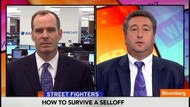
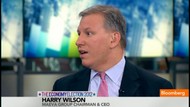


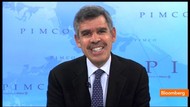
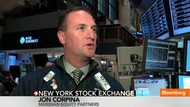

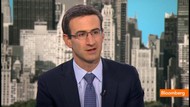






 Rate this Page
Rate this Page
Bloomberg moderates all comments. Comments that are abusive or off-topic will not be posted to the site. Excessively long comments may be moderated as well. Bloomberg cannot facilitate requests to remove comments or explain individual moderation decisions.